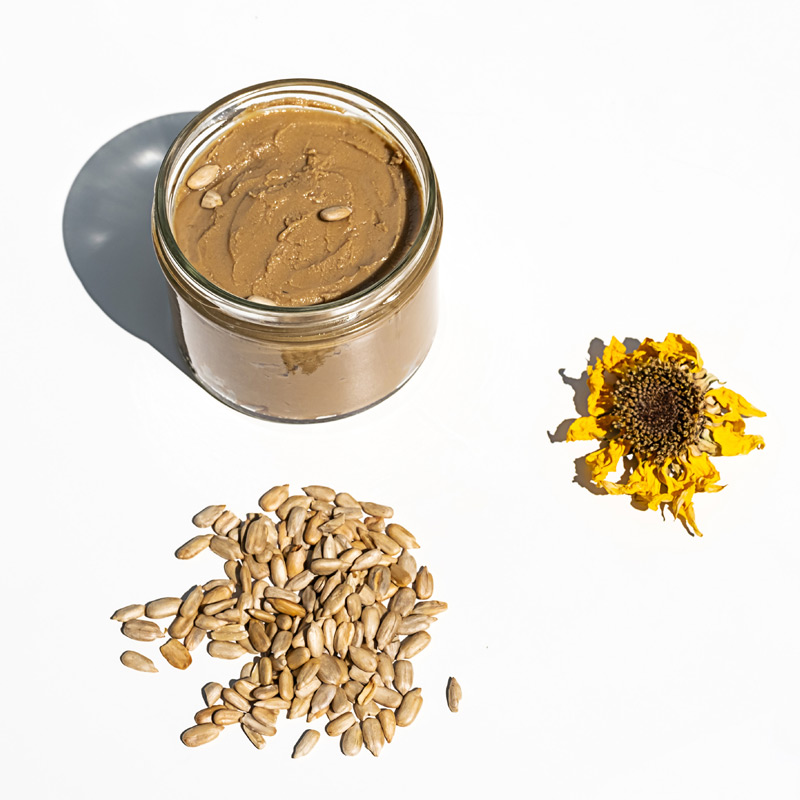
100 gr |
-- |
|
|---|---|---|
| Carbohydrate (gr) | 15.04 |
4928.47 |
| Protein (gr) | 3.59 |
1176.23 |
| Fat (gr) | 12.46 |
4083.43 |
| Fiber (gr) | 1.36 |
445.97 |
| Cholesterol (mg) | 14.64 |
4795.8 |
| Sodium (mg) | 325.27 |
106557.75 |
| Potassium (mg) | 392.16 |
128471.4 |
| Calcium (mg) | 78.15 |
25603.27 |
| Vitamin A (mg) | 46.04 |
15084.01 |
| Vitamin C (mg) | 6.16 |
2019.31 |
| Iron | 0.62 |
203.1 |
Sunflower seeds are small but mighty, packed with essential nutrients that contribute to various aspects of health. They are especially rich in B vitamins and vitamin E, making them an excellent addition to a balanced diet. Their high vitamin E content is particularly noteworthy for its role in promoting healthy hair. This powerful antioxidant not only supports better blood circulation to the skin and scalp but also helps nourish hair follicles, facilitating stronger, thicker, and darker hair growth. Regular consumption of sunflower seeds could be a simple yet effective way to improve hair health.
Caloric Content and Nutritional Value: When considering caloric intake, it's essential to note that 100 grams of sunflower seed paste contains 593 calories, making it a calorie-dense but nutrient-rich food. Despite their relatively high caloric content, they offer significant health benefits when consumed in moderation.
The calorie content of 100 grams of sunflower seed paste is 593 calories.
Liver Health: Sunflower seeds are known for their hepatoprotective properties, making them beneficial for liver function. Their antioxidant content can help reduce oxidative stress and support detoxification processes in the liver.
Diabetes Management: These seeds have been found to assist in managing blood sugar levels, making them a smart snack choice for individuals with diabetes. Their low glycemic index and high fiber content help regulate blood sugar spikes.
Heart Health: Sunflower seeds are rich in healthy fats, especially unsaturated fats, which are heart-friendly. They also contain magnesium and phytosterols, which contribute to lowering cholesterol levels, reducing inflammation, and supporting overall cardiovascular health.
Rich in Antioxidants: The high antioxidant levels, particularly vitamin E and selenium, make sunflower seeds a potent food for fighting oxidative stress and free radicals. This, in turn, may help reduce the risk of chronic diseases and promote overall cellular health.
Blood Sugar Regulation: Emerging research suggests that sunflower seeds might assist in improving insulin sensitivity and regulating blood sugar levels, making them a suitable addition to a diabetes-friendly diet.
Mineral-Rich: Sunflower seeds are an excellent source of key minerals such as magnesium, phosphorus, and selenium. These minerals play crucial roles in bone health, immune function, and metabolic processes.
A Filling and Nutritious Snack: Due to their high protein, healthy fat, and fiber content, sunflower seeds can serve as a satisfying and energy-boosting snack. They are an ideal choice for those looking to stay full and energized throughout the day without reaching for unhealthy processed foods.
Conclusion: Incorporating sunflower seeds into your diet can offer a wide array of health benefits, from improving hair health to supporting vital organs like the liver and heart. Despite their high calorie content, their nutrient density makes them a valuable food to enjoy in moderation. Whether sprinkled on salads, blended into spreads, or eaten on their own, sunflower seeds are a delicious and versatile snack for health-conscious individuals.